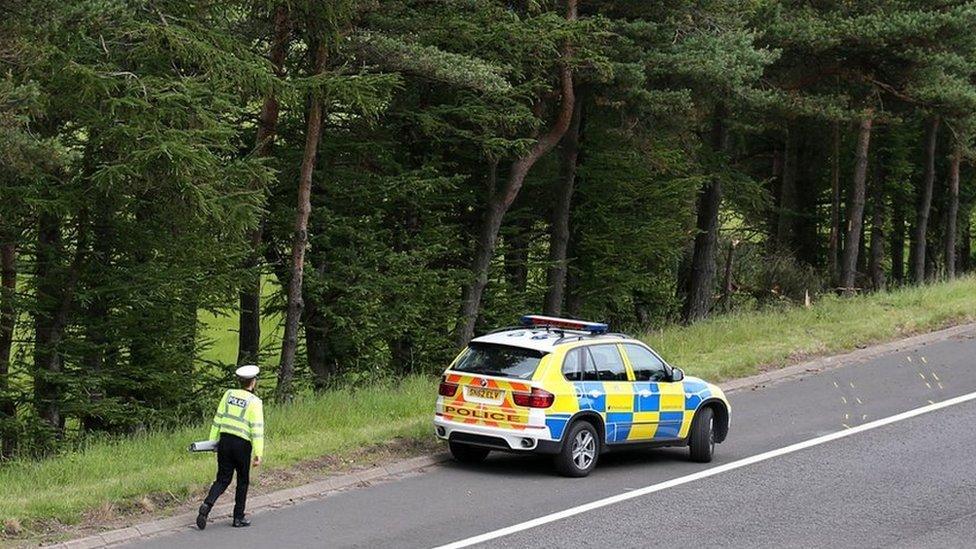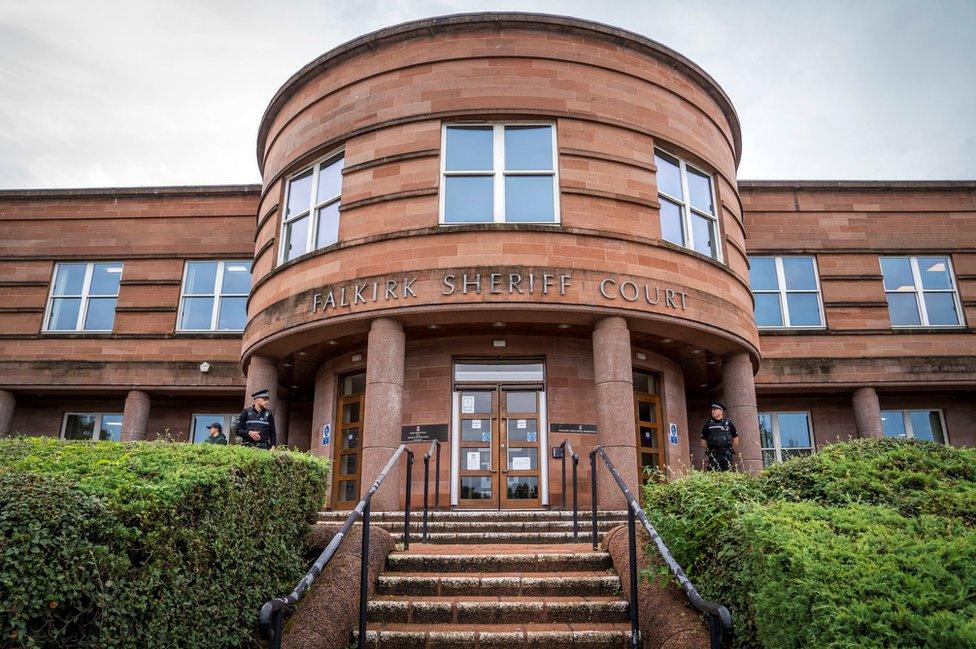Police Scotland call-handling overhauled after M9 crash
- Published

Lamara Bell and her partner John Yuill were found inside their car after it crashed down an embankment off the M9 in July 2015
Police Scotland's call-handling system has been overhauled since a car crash on the M9 was not attended for days, a fatal accident inquiry (FAI) has heard.
John Yuill, 28, and his partner Lamara Bell, 25, died after their car left the motorway near Stirling in 2015.
Retired sergeant Brian Henry previously said he was "tortured" by his failure to log a call about the incident.
It later emerged he had been inadequately trained on the system before his overtime shift.
As a result, no action was taken to investigate the incident until three days later.
When the Renault Clio was eventually discovered, Mr Yuill was found to be dead and Ms Bell died in hospital soon after.
The inquiry previously heard that Mr Henry had two hours shadowing in the call centre before he started taking live calls.
On Wednesday, Ch Supt Paul Wilson told the FAI that the practice of using ad hoc staff to take calls had ceased after the M9 crash.
He said such staff were "absolutely not" employed to take calls from the public.
The FAI at Falkirk Sheriff Court heard that training requirements for service centres had been formalised and there was now a "well defined" process which lasted eight weeks.
It involves four weeks of classroom training in systems and procedures followed by an assessment.
New recruits are then monitored and assessed for four weeks while taking non-emergency calls.
Last year the force took more than 700,000 emergency calls and around 1.8 million 101 calls.

Police near the scene of the 2015 crash
The inquiry heard that a risk assessment is now carried out when a member of the public calls - a process that did not exist when Mr Henry took the initial call about the M9 crash.
Ch Supt Wilson agreed that if a call of this nature was made to Police Scotland today it would have been handled differently.
He added that the training and tools available now "were simply not available" to the officers who were doing overtime shifts in Bilston Glen.
In 2015, the calls were categorised numerically as follows:
Grade one - an immediate or apparent threat to life or ongoing crime
Grade two - a degree of importance or urgency associated with police action
Grade three - an incident that is not ongoing but the outcome could be prejudiced by significant delay
The inquiry previously heard that had the non-emergency 101 call been properly logged by Mr Henry it would likely have been a grade two.
Chi Supt Wilson said call handlers today were "armed with more information and better systems to use with better prompts than in 2015."

The FAI is being held at Falkirk Sheriff Court
The FAI had previously heard that Mr Henry wrote down details of the incident in his notebook but failed to log it on the police IT system.
On Tuesday, Mr Henry put the mistake down to human error and apologised to the families.
He also told the FAI: "The incident lives with me every day and will always do so."
In a statement Mr Henry - who retired in 2018 after 30 years of service - told the inquiry he felt "dreadful" for the families.
Mr Henry also said he found it hard to come to terms with the role he played in the crash response at the newly-reorganised force call centre at Bilston Glen, Midlothian.
The inquiry also previously heard that farmer John Wilson called Police Scotland after spotting the Renault Clio on the morning of 5 July.
According to a statement shown to the inquiry last week, Mr Henry was phoned by Laura Henderson, a manager at the Bilston Glen police call centre, on 8 July 2015.
He was asked about a call he had answered three days earlier while working an overtime shift answering 101 calls.
Elsewhere in the statement he said: "It was the worst call you can imagine as a police officer. A call you don't want to receive."
Ms Henderson told the FAI she recalled Mr Henry said he felt physically sick.
The inquiry also heard that a post-mortem examination carried out on Ms Bell recorded her cause of death as complications following a road traffic incident.
By the time she was found on 8 July, three days had passed since the crash.
The inquiry heard that had she received medical treatment on the day of the crash she would probably have survived, though with the likelihood of a long-term neurological disability.
In September 2021 Police Scotland admitted failures in its system contributed to the death of Ms Bell.
The then Chief Constable Iain Livingstone apologised "unreservedly" on behalf of policing in Scotland.
The force later agreed to pay Ms Bell's family more than £1m in compensation.
The inquiry, before Sheriff James Williamson, continues.
Related topics
- Published10 October 2023

- Published5 October 2023

- Published3 October 2023

- Published25 September 2023

- Published22 September 2023
